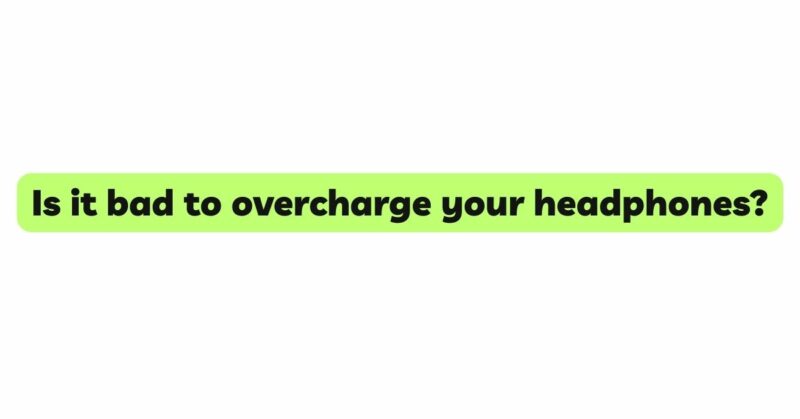As wireless headphones become an integral part of our daily lives, concerns about charging practices and battery health have also surfaced. Among the various charging myths, one of the most common fears is overcharging headphones. This article aims to debunk the myth surrounding overcharging and provide a comprehensive understanding of charging practices for wireless headphones, particularly those equipped with lithium-ion (Li-ion) batteries. By exploring the science behind charging, safety mechanisms in place, and practical tips, we aim to clarify whether it is bad to overcharge your headphones and how to optimize battery performance and longevity.
- The Charging Process for Wireless Headphones:
Understanding the charging process for wireless headphones is essential to dispel any misconceptions. When connected to a power source, the headphones draw electrical energy, which is stored as chemical energy in the lithium-ion batteries. This stored energy powers the headphones, providing you with a seamless audio experience.
- Debunking the Overcharging Myth:
The fear of overcharging headphones is based on the belief that continuously charging them beyond full capacity damages the battery. However, with modern lithium-ion batteries, this is largely a myth. Unlike older battery technologies, Li-ion batteries are designed with safety features to prevent overcharging.
- How Lithium-ion Batteries Work:
Li-ion batteries have revolutionized the electronics industry due to their high energy density, lightweight design, and reduced self-discharge rates. These batteries use lithium ions to move from the positive electrode to the negative electrode during charging and discharge. When the battery reaches full capacity, the lithium ions are no longer able to move between the electrodes, thus preventing overcharging.
- Safety Mechanisms Against Overcharging:
Manufacturers implement several safety mechanisms to safeguard against overcharging:
a) Voltage Regulators: Headphones are equipped with voltage regulators that control the voltage level during charging, preventing excessive voltage from reaching the battery.
b) Smart Charging Circuits: Most modern headphones come with intelligent charging circuits that automatically stop charging once the battery reaches full capacity. This feature prevents overcharging and protects the battery from potential damage.
c) Deep Sleep Mode: Some headphone models activate a low-power deep sleep mode when the battery is fully charged. This minimizes energy consumption and reduces the risk of battery damage due to prolonged charging.
- Practical Tips to Optimize Battery Life and Performance:
While overcharging is not a significant concern, there are practical tips you can follow to optimize the battery life and performance of your wireless headphones:
a) Partial Charging: Charging your headphones partially, such as when the battery is low or around 50%, can help extend battery life.
b) Charge Before Use: Charge your headphones before using them, rather than leaving them plugged in after they are fully charged, to prevent unnecessary exposure to high voltage.
c) Unplug When Fully Charged: If you choose to charge your headphones overnight, unplug them once they reach full capacity to prevent overcharging.
d) Charge in Moderation: Avoid excessive charging or charging too frequently, as this can contribute to battery degradation over time.
e) Proper Storage: If you plan to store your headphones for an extended period, ensure they are charged to around 50% before storing them in a cool, dry place, away from direct sunlight.
f) Follow Manufacturer’s Guidelines: Refer to the user manual or product documentation for specific charging recommendations provided by the headphone manufacturer.
- Factors Affecting Battery Life:
Several factors can influence the overall battery life of wireless headphones:
a) Volume Levels: Playing audio at higher volume levels can consume more power, leading to faster battery drain.
b) Usage Patterns: Continuous music playback, frequent phone calls, and extended use of features like noise-cancellation can also impact battery life.
c) Ambient Conditions: Extreme temperatures, both hot and cold, can influence battery performance.
- Battery Health and Replacement:
Over time, battery performance may naturally degrade. If you notice a significant decrease in battery life or if the battery no longer holds a charge as it used to, consider getting the battery replaced through an authorized service center.
Conclusion:
The myth of overcharging wireless headphones stems from older battery technologies and is largely unfounded for modern lithium-ion batteries. Advanced safety mechanisms, such as voltage regulators and smart charging circuits, protect headphones from overcharging. Leaving headphones plugged in overnight or for extended periods does not pose a significant risk to the battery’s health or performance. Instead, focusing on practical charging tips and usage patterns will optimize battery life and ensure reliable performance from your wireless headphones. By understanding the science behind charging and the safety measures in place, you can confidently enjoy your headphones without worrying about overcharging.


